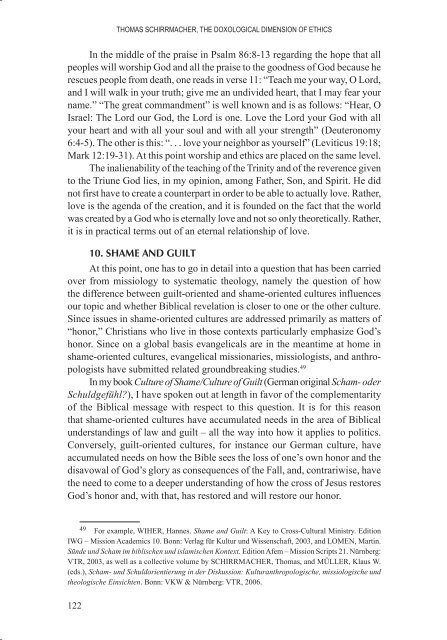Fides 20 N2 - Revista do Centro Presbiteriano Andrew Jumper
Revista Fides Reformata 20 N2 (2015)
Revista Fides Reformata 20 N2 (2015)
Create successful ePaper yourself
Turn your PDF publications into a flip-book with our unique Google optimized e-Paper software.
Thomas Schirrmacher, The <strong>do</strong>xological Dimension of Ethics<br />
In the middle of the praise in Psalm 86:8-13 regarding the hope that all<br />
peoples will worship God and all the praise to the goodness of God because he<br />
rescues people from death, one reads in verse 11: “Teach me your way, O Lord,<br />
and I will walk in your truth; give me an undivided heart, that I may fear your<br />
name.” “The great commandment” is well known and is as follows: “Hear, O<br />
Israel: The Lord our God, the Lord is one. Love the Lord your God with all<br />
your heart and with all your soul and with all your strength” (Deuteronomy<br />
6:4-5). The other is this: “. . . love your neighbor as yourself” (Leviticus 19:18;<br />
Mark 12:19-31). At this point worship and ethics are placed on the same level.<br />
The inalienability of the teaching of the Trinity and of the reverence given<br />
to the Triune God lies, in my opinion, among Father, Son, and Spirit. He did<br />
not first have to create a counterpart in order to be able to actually love. Rather,<br />
love is the agenda of the creation, and it is founded on the fact that the world<br />
was created by a God who is eternally love and not so only theoretically. Rather,<br />
it is in practical terms out of an eternal relationship of love.<br />
10. shame and guilt<br />
At this point, one has to go in detail into a question that has been carried<br />
over from missiology to systematic theology, namely the question of how<br />
the difference between guilt-oriented and shame-oriented cultures influences<br />
our topic and whether Biblical revelation is closer to one or the other culture.<br />
Since issues in shame-oriented cultures are addressed primarily as matters of<br />
“honor,” Christians who live in those contexts particularly emphasize God’s<br />
honor. Since on a global basis evangelicals are in the meantime at home in<br />
shame-oriented cultures, evangelical missionaries, missiologists, and anthropologists<br />
have submitted related groundbreaking studies. 49<br />
In my book Culture of Shame/Culture of Guilt (German original Scham- oder<br />
Schuldgefühl?), I have spoken out at length in favor of the complementarity<br />
of the Biblical message with respect to this question. It is for this reason<br />
that shame-oriented cultures have accumulated needs in the area of Biblical<br />
understandings of law and guilt – all the way into how it applies to politics.<br />
Conversely, guilt-oriented cultures, for instance our German culture, have<br />
accumulated needs on how the Bible sees the loss of one’s own honor and the<br />
disavowal of God’s glory as consequences of the Fall, and, contrariwise, have<br />
the need to come to a deeper understanding of how the cross of Jesus restores<br />
God’s honor and, with that, has restored and will restore our honor.<br />
49 For example, WIHER, Hannes. Shame and Guilt: A Key to Cross-Cultural Ministry. Edition<br />
IWG – Mission Academics 10. Bonn: Verlag für Kultur und Wis senschaft, <strong>20</strong>03, and LOMEN, Martin.<br />
Sünde und Scham im biblischen und islamischen Kontext. Edition Afem – Mission Scripts 21. Nürnberg:<br />
VTR, <strong>20</strong>03, as well as a collective volume by SCHIRRMACHER, Thomas, and MÜLLER, Klaus W.<br />
(eds.), Scham- und Schul<strong>do</strong>rientierung in der Diskussion: Kulturanthropologische, missiologische und<br />
theologische Einsichten. Bonn: VKW & Nürnberg: VTR, <strong>20</strong>06.<br />
122

















